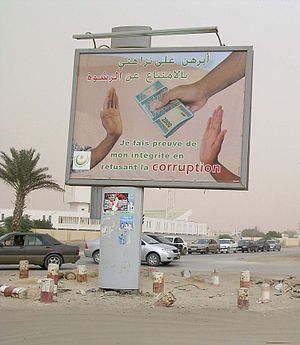| Languages of Mauritania | |
|---|---|
 Anti-corruption campaign in Nouakchott, in Arabic and French Anti-corruption campaign in Nouakchott, in Arabic and French | |
| Official | Arabic |
| Semi-official | African French (working language) |
| Recognised | Pulaar, Soninke, Wolof |
| Vernacular | Hassaniya Arabic |
| Minority | Zenaga-Berber, Tamasheq-Berber |
| Signed | Francophone African Sign Language |
| Keyboard layout | Arabic keyboard / AZERTY  |
The languages of Mauritania include the official language, Arabic, three national languages, Pulaar, Soninke and Wolof, and French, a former official language which is still the language of working, education and administration.
The languages fall into two families: Afroasiatic languages, namely Zenaga-Berber, Tamasheq-Berber, Hassaaniya Arabic and Standard written Arabic; and Niger-Congo languages, principally Pulaar, Soninke and Wolof.
Afro-Asiatic languages
- Arabic
- Modern Standard Arabic is the official language of the government of Mauritania.
- Hassaniyya Arabic (70%-80% of the population) is the colloquial spoken variety of Arabic. Its name is derived from the tribe of the Bänū Ḥassān. The language serves as a lingua franca in the country. It is also the language of the Imraguen who also use elements of Soninke.
- Berber
- Zenaga is a Berber language that was more widely spoken in the past, but is still used in the south of the country, close to the River Senegal. The speakers of the Zenaga language are eponymously known as Zenaga Berbers. Islamisation and Arabisation of the population have reduced the number of Berber speakers.
- Tamasheq is a Berber language spoken by Tuaregs in the extreme south-east of the country, who have moved into Mauritania from Mali.
French
Main articles: Maghreb French and African FrenchAccording to Ethnologue, there are 705,500 speakers of French in Mauritania. It serves as a de facto national working language. Mauritania is a member of the International Organisation of La Francophonie (La Francophonie).
Sometimes French is used for certain speeches by parliamentarians in the Senate and the National Assembly, and they are broadcast on radio and television in this language. In certain areas of administration, it has undeniably established itself as the working language. For example, all structures of the Ministry of Finance (Customs, Taxes, Budget, Treasury, Domains, etc.) work in this language; at the Ministry of Health, it’s the same thing. The only exception that could be cited is the Ministry of Justice where Arabic undeniably predominates; the Ministry of the Interior and that of National Education are almost equal in terms of the use of the two languages which depends mainly on the training of the user.
However, here too, there are exceptions: for example, at the Ministry of the Interior, encrypted messages and at the Ministry of National Education, Baccalaureate transcripts are exclusively in French.
Niger-Congo languages
The speakers of this group make up 20%-30% of the population.
- Wolof
- Soninke is spoken by some 180,000 speakers.
- Pulaar (15%-20%) is spoken in Mauritania by the Fula and the Toucouleur.
- Bambara
- Serer
See also
Notes
- ^ Cheikh, Mohamed Vall Ould (2012), Nglasso-Mwatha, Musanji (ed.), "Le français en Mauritanie : statuts et pratiques", Environnement francophone en milieu plurilingue, Études africaines et créoles (in French), Pessac: Presses Universitaires de Bordeaux, pp. 375–397, ISBN 979-10-300-0671-1, retrieved 2024-09-30
- Alassane Yero Ba et Abdoul Echraf Ouedraogo, Portrait des dynamiques linguistiques et de l'alphabétisation en Mauritanie, Une analyse à partir des données du recensement de 2013.
- ^ Taine-Cheikh, Catherine (December 2023), Reutner, Ursula (ed.), "Mauritania: French in Mauritania", Romance Languages in Africa, Serie Manual of Romance Linguistics, de Gruyter, pp. 289–317, retrieved 2024-06-28
- "French". Ethnologue. Retrieved 29 January 2018.
- English: Fula; French: Peul; in central and eastern West Africa the endonym is Fulfulde
External links
| Languages of Mauritania | |
|---|---|
| Official language | |
| National languages | |
| Unrecognized languages | |
| Main foreign languages | |
| Languages of Africa | |
|---|---|
| Sovereign states |
|
| States with limited recognition | |
| Dependencies and other territories |
|